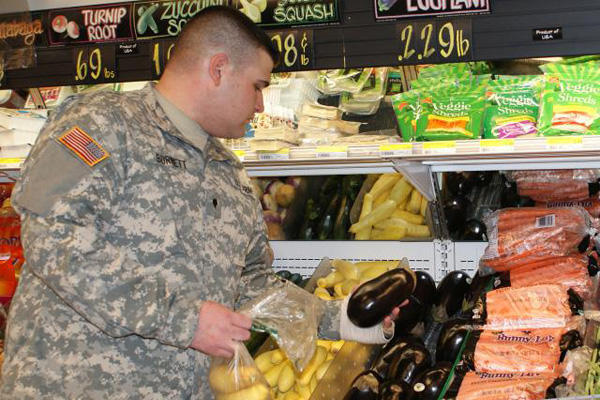A new produce plan for military commissaries in Asia and Guam could result in higher prices, less selection and safety concerns, industry insiders say.
"Under any scenario, it's going to increase the cost to patrons," said a source with intimate knowledge of the commissary system. "They are going to pay for it one way or another."
The change, included in a Defense Commissary Agency contract announcement released in early February, would save the agency $35 million a year, said a source close to the issue, by ending the shipping subsidy for produce sent to commissaries located in Japan, Korea and Guam. The contractor would instead be required to source items locally or pay the cost of shipping them out of pocket. The changes would take effect in September.
Under the current system, only about 25 percent of produce sold at commissaries in the Asia Pacific region is purchased locally, one industry source said. The rest is purchased from the U.S. as part of a $34.5 million yearly contract, with the cost of transporting that food covered by taxpayers. Produce prices at the Asia Pacific commissaries are based off the stateside cost of the product.
Because DeCA would no longer be paying for shipping, the change would save the system money. But commissary shoppers would be footing the bill for more expensive produce because prices would instead be based off the local Asian market rates rather than stateside prices.
"The shoppers are going to experience a huge sticker shock," an industry source said. "We came up with the conclusion that, on average, prices are going to double, simply based on the fact that that's what this produce costs off base [in the Asia Pacific market] and that will be the new benchmark."
Eliminating the taxpayer transportation subsidy is one way the commissary is reported to be looking at saving money in light of a new proposal that calls for a $1 billion decrease in the agency's operating budget by 2017.
But commissary officials said this produce plan change has nothing to do with that proposal.
"The decision on the method of acquisition was made last year -- long before the new DoD budget cut proposal," said Gary Frankovich, a DeCA spokesman. "This is a continuation of the standardization of our produce acquisition strategy that began in 2005."
But others say the change is absolutely related to the budget cuts.
"It has all to do with budget reductions. Does it have anything to do with that [proposal] language? Maybe not. But DeCA knows it's got to reduce some costs," said a source with intimate knowledge of DeCA. "It's all about budget reductions."
The proposed change also caught the attention of officials with a House Armed Services subcommittee that oversees the commissary system. Rep. Joe Wilson (R-S.C.), sent DeCA a letter in late February asking it to hold off on the changes. He said they should wait until the Military Compensation and Retirement Modernization Commission, a congressional mandated committee examining military benefits, presents its findings in February of next year.
"I urge you to delay this pending [contract], re-evaluate your market research data and partner with the resale industry to ensure DeCA is keeping faith with the service members and families it serves," the letter says. "We owe to all of these men, women and children a full investigation of the potential costs and benefits of such drastic changes before it occurs."
Wilson's re-election committee received at least $10,000 in campaign contributions last year from individuals affiliated with the commissary industry.
Selling locally sourced produce at overseas commissaries is not a new concept. Stores in Europe have relied almost exclusively on local produce for over 10 years. But that is not a system that has been used in Asian markets or Guam, sources said, because produce availability there is so much less and the prices, therefore, higher.
Moving forward with the plan could also raise safety concerns, insiders said. Local growers do not follow the same food safety standards or chain of distribution rules to which growers in the U.S. are required to adhere.
Some commissary shoppers stationed in Japan and Korea, however, said the change would not really bother them. They said they already do much of their produce shopping off base anyway because the quality is better and price lower. If an item is not available or costs too much, they simply don't buy it.
"Even though apples are expensive in Japan, they are cheaper out in town and usually stay fresh longer," said Christina Hunter, a Navy spouse stationed at Naval Air Facility Atsugi, Japan.
Chantal Shelstad, an Army wife in Korea who shops at the Yongsan, Korea, commissary, agreed.
"The produce that they ship from the U.S. is actually worse than the local produce. It goes bad faster. It's not fresh. They don't taste very good," she said. "When I'm shopping for produce at the commissary, typically I go to the Korean side of things first, even if it's more expensive. Because of the state of produce at the commissary, I try to shop on the economy more for the things I need. I prefer Korean produce -- it's fresh, it's not too expensive, and it tastes awesome."
-- Amy Bushatz can be reached here.































